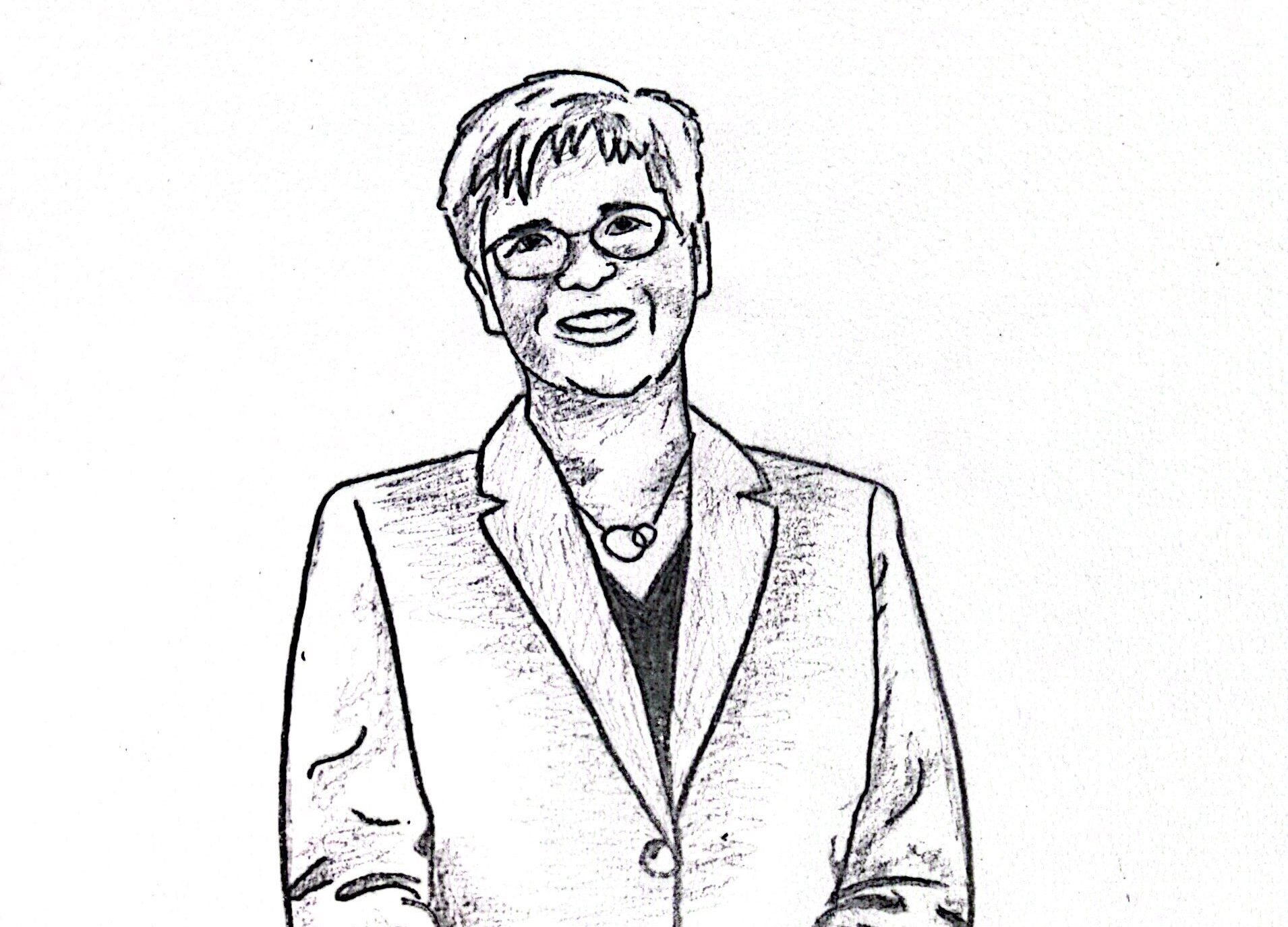Tyson Miller: When you were thinking about leaving Cornell and going to Goshen, a colleague said to you, “We will miss you, but your leadership will matter much more at Goshen.” Can you explain what they meant and how that factored into your decision to come here?
Rebecca Stoltzfus: That particular quote was from a professor who taught leadership in the department of labor relations. She was somebody with a lot of cred in leadership.I remember there were a couple of days when I was making calls and letting people know that I was leaving. I had made my decision, but I was kind of insecure and unsure how my colleagues would react. And her reaction was so authentic on her part.
Like, as a professor who studies organizational leadership, it wasn’t generous or “oh, I want to throw roses at your feet” kind of thing. She was extremely straight shooting as somebody who studies organizational leadership. “That is such a good move, your leadership will matter a lot more there.”
Miller: What memories do you have of your first year being back at Goshen as president?
Stoltzfus: Oh, here’s a memory that I think about with fondness. I was going to do a chapel. I think my kids were both in college, I was a new president and I was trying to figure out my rhetorical style and how authentic and vulnerable I was willing to be with this community. I had, in the sanctity of my home office, written this chapel talk. When I got over there in the church chapel building, I was really afraid.
I’m a pretty confident public speaker, so it’s not like I have stage fright about public speaking. It was more the [fact that] I had to set a tone of authenticity. This is the real Becky.
It was, I don’t know, 10 minutes till. I have done yoga over the years, so I went into a back room. That building has a lot of hidden spaces. I found my way behind a door, hid, and I went through the warrior yoga poses and got my confidence back.
Miller: How has this job changed you as a person?
Stoltzfus: Well, this job is not easy in the best of times, and I have governed through some of the worst of times. I think it has made me tougher and more confident. And I say that not in a sense of being so sure that I know what is right, but I’m more sure that I know and love this community and that I have more trust in myself.
Miller: You spent the beginning of this year in San Antonio at a presidential renewal program. What did you take away from that?
Stoltzfus: Some really concrete things, like it matters to sleep.
And then other things, the stuff that you might think of, just things about thinking about how long you were going to be president … and how your work is structured to either help you continue to be healthy and have a sustainable presidency or whether it’s just kind of all sucking the life out of you.
Miller: How long do you think you should be president? It’s an interesting question.
Stoltzfus: I’m in a conversation with the board about that, and so I think “for a while longer” is what I would say. I don’t feel like the job, or the structure of Goshen College and the way my work is structured, is sucking the life out of me.
Miller: How do you feel like Goshen College has handled the challenges that have come up in the past couple months on a national level?
Stoltzfus: I would say as well as anybody is and better than many.
I was on a call with the president of the Hispanic Association for Colleges and Universities, this was like week four of the new federal administration, and we were wondering what was going to be happening in terms of HSI funding and all sorts of things.
At the end of that call, he said, “we’re on a roller coaster, and we didn’t choose to be on this roller coaster, but we’re going to be on it for a while, so we might as well learn to enjoy it.” Which was a remarkable thing to say. You should know that I do not like roller coasters.
I remember getting off that Zoom call and thinking to myself, probably enjoying this roller coaster is too far, you know, I’m not going to get there. But I need to stop throwing up.
I want to be clear that it’s not that I believe that everything that this administration stands for is wrong or ridiculous or doesn’t have any validity. There are real debates going on and real debates that need to be had, but the method of governing right now is kind of nauseating for anybody in leadership.
Miller: Bluffton University attempted a merger. It got called off, and it seems like a lot of the other Mennonite schools in the country are in various states of having issues. Goshen has managed to avoid a lot of things that we’re seeing with other places, for the most part. How closely are you watching those situations with those other colleges and how do you think Goshen has managed to avoid some of those public struggles like Bluffton or even EMU is having?
Stoltzfus: Hesston [College, as well]. It was excellent work and good fortune that we launched our campus master plan, strategic plan and comprehensive campaign plan … just before COVID 19 became a global pandemic, and things were locked down. So we had set those intentions. The pandemic slowed those down, but did not stop them.
I’m really proud that we pulled that off through the pandemic, and then the fact is that many colleges are confronting financial challenges that we share, but they’re less acute for us. They’re not absent for us, but they’re less acute for us because we launched that campaign and we’ve been executing on it.
Miller: Is Goshen College sustainable in the long term? Are there conversations about the specific degrees and programs that the college offers, or ways that you’re thinking of adapting in the near to far future?
Stoltzfus: That is always the life of a college or business, and it always will be. We’ve had programs that have ended and we’ve had new programs that have started. In my presidency, we’ve had two new programs that have started at the undergraduate level, criminal justice and restorative justice and public health. We’ve started new programs at the graduate level, the transition to teaching and the Master of Arts in teaching and the Master of Social Work. So we have to change and adapt to market forces.
Miller: You mentioned, listening to the market forces that are telling you what you need to do. What are they saying right now? What are things that you’re listening to?
Stoltzfus: Yeah, so there’s a lot of emphasis right now on STEM and professional degrees. There’s a quieter demand for creative, adaptive, liberal arts majors that can do more than one thing. Our challenge is to meet the market demand for marketable, career ready degrees, and not to let go of our interdisciplinary liberal arts foundations.
Miller:
Something that a lot of people bring up is the lack of African American or Black professors. In the class of 2028 that just came in, there were only nine incoming students that were African-American. So the question is, does Goshen College have a problem with African American representation on campus?
Stoltzfus: Yes. Higher ed in genreal has a problem with lack of African American representation. And that is not a new problem. That’s an old problem that America created for itself and that higher education further created for itself.
Miller: Are there things that are initiatives that are happening to try and bolster that representation on campus?
Stoltzfus: Yes. We are trying to allocate attention and resources to a variety of issues, but I would say the things that we are doing in the space of trying to recruit more African American faculty and students to Goshen College is that HR has implemented a hiring structure called the search advocacy program, and that is evidence based and adapted to higher education.
It’s a long game. It’s not something that anyone can correct rapidly. But I would point to those HR processes. We have in the past three or four years started a Black employee fellowship.
On the enrollment side, we, through the Center for Community Engagement, are really experimenting and have experimented with a variety of ways to increase the pathway of regional African American students to Goshen College. We will be piloting a bridge program targeted to African American students locally to experience Goshen College prior to enrolling and create more affinity and belonging with the campus.
Miller: We have a couple questions to finish it off. These were submitted by students.
How do you choose your word of the year and how long in advance do you know it?
Stoltzfus: I don’t start thinking about my word of the year until the holiday break, until December, and then it’s a conversation with my sisters. This year it was very clear because I was focused on renewal, and I was going to go to that renewal retreat. So that was sort of an easy pick for me. I think there was one year where I didn’t land my word of the year until late in January.
Miller: What is your favorite meal at the Rott?
Stoltzfus: Ah, that’s a good question. Okay, so like two days ago or last week, they served barbecue chicken, which was really good. They’re doing something new in the hot line that is like a Korean chicken stew that I really like. They’ve got me with their cookies. I think their cookies are really good.
Miller: You’re the president. Can you enact executive orders?
Stoltzfus: Yes. Yes, I can.
Miller: Have you done that at all?
Stoltzfus: Well, it depends. It is not my style of leadership to publicly make executive orders and hold them up for the camera. But let me think … I reversed a Res Life policy quite a few years ago.
I add and subtract vice presidents. I created the President’s Graduating Leader Award, and I created the faculty and staff employee awards.
Miller: Will you say what the Res Life policy that you reversed was?
Stoltzfus: It was the first iteration of requiring students to live on campus and I felt that it was not well vetted and communicated, so I stopped it.




